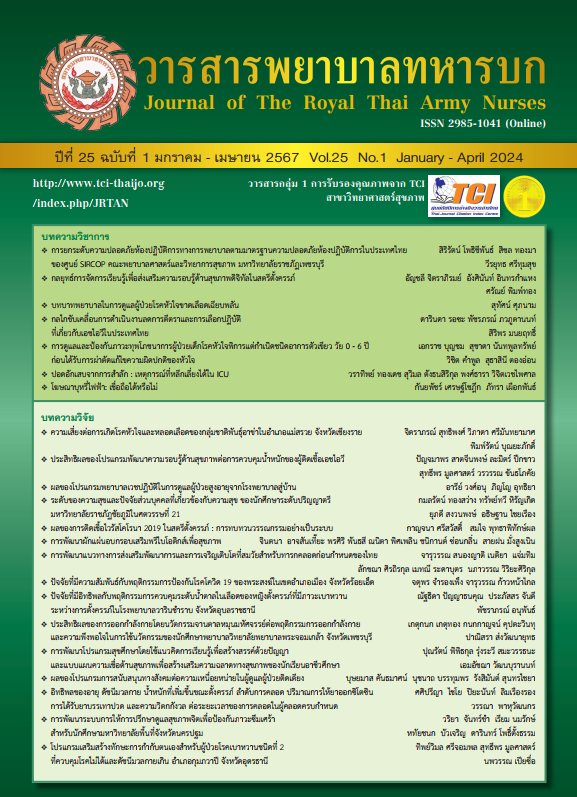Effects of an Experiential Learning Enhancement Program on knowledge and care practices of caregiver-dependent elderly
Keywords:
Experiential Learning Enhancement Program, Caregiver, Dependent ElderlyAbstract
This research is a quasi-experimental research have a purpose to study the effect of an experiential learning promotion program on knowledge and practice of caring for the dependent elderly of elderly caregivers The sample group consisted of 60 elderly carers who were randomly drawn into group samples, then 2 groups were drawn into the experimental group and the comparison group, 30 people each. The experimental group received an experiential learning program for a period of 6 weeks. The comparison group was assigned to perform normal tasks. The research tools were 1) an experiential learning promotion program 2) a data collection consisting of general information questionnaire observation form for caring for the elderly and a knowledge test of taking care of the elderly Verify accuracy Cronbach’s alpha coefficient is .88. Data were analyzed by descriptive statistics and t-test. The research results can be summarized as follows The average score of knowledge and practice of caring for the dependent elderly of elderly caregivers After receiving the experiential learning promotion program for the experimental group higher than the comparison group It was statistically significant (p<.001). The average scores of knowledge and practice of caring for the dependent elderly of the experimental group after receiving the experiential learning promotion program higher than before receiving the program Statistically significant (p<.001) From the research results the implementation of experiential learning programs should be supported, promoted and disseminated. to apply in designing health services in various matters According to the experience of the target group.
Downloads
References
National Statistical Office Ministry of Digital Economy and Society. Report 2021; (in Thai)
Department of Older Persons Ministry of Social Development and Human Security. Report 2018. Strategy of the Department of Elderly Affairs, 20 years. Bangkok: Samlada Printing House. 2018; (in Thai)
Vudhironarit S, Pommala W. The Caring for Bedbound Old Adult: A Systematic Review. Journal of The Royal Thai Army Nurses. 2021; 22(3):367-75. (in Thai)
Health Systems Research Institute. Research to develop a long-term care system for dependent elderly under the National Health Security System. Health system information and knowledge warehouse. 2018; (in Thai)
National Health Security. Long-term Care Public Health for Depressed. Bangkok: National Health Security Office. 2016; (in Thai)
Department of Health, Ministry of Public Health. Guidelines for applying for permission to use the elderly care curriculum at the area level, Department of Health, Ministry of Public Health. Revised edition. Nonthaburi: Department of Health, Ministry of Public Health. 2020; (in Thai)
Utthiya P, Sereewichayasawad N. Roles of Nurses in Home Health Care Unit in the COVID 2019 Pandemic Situation, Journal of The Royal Thai Army Nurses.2022;23(2):25-32. (in Thai)
Kolb D.A..Experiential Learning: Experience as the Source of Learning and Development 1984. New Jersey: Prentice-Hall.
Yalangsee S, Effects of Experiential Learning Program on Knowledge and Skills of Consumer Protection of Food Products Among Village Health Volunteers of Tambon Kohlibong, Amphoe Kantang, Changwat Trang, Sirindhorn College of Public Health,Trang.2017; (in Thai).
Kuntajai U, Tamdee D, Aungwattana S. Effects of Experiential Learning on Knowledge, Screening Practice, and Advising on Colorectal Cancer Prevention among Village Health Volunteers, Nursing Journal of the Ministry of Public Health. 2020; 31(1): 83-95. (in Thai)
Soowit B, PanasakulkanKhachee S, viboon P, Lhaosupab N. Effects of Using Learning Model for Promoting the Holistic Palliative careamong Nursing Students, Kuakarun Faculty of Nursing. Journal of The Royal Thai Army Nurses.2018;19(1):210-20. (in Thai)
Kuntajai U,Tamdee D, Aungwattana S. Effects of Experiential Learning on Knowledge, Screening Practice, and Advising on Colorectal Cancer Prevention among Village Health Volunteers. Nursing Journal of the Ministry of Public Health. 2021;31(1): 83-95. (in Thai)
Doramarn N, Malakul Na Ayudhaya P,Kirdpitak P. An Exeperiential Learning and Critical Reflection, Journal of Psychology Kasem Bundit University.2020; 10:20-28. (in Thai)
Meethip N, Tumdee D, Bhuddhirakkul P.Effects of Experiential Learning on Knowledge and Screening Practice and Advice for Hypertension Among Village Health Volunteers. Nursing Journal. 2016;43(Supplement):104-15. (in Thai)
Tawnil N, Tamdee D, Aungwattana S. Effects of Experiential Learning on Knowledge, Screening, and Advice Regarding Opisthorchiasis Among Village Health Volunteers. Nursing Journal Chiang Mai University. 2022; 49(3):203-17. (in Thai)
Raksa P, Aungwattana S,Tamdee D.Effects of Experiential Learning Program on Knowledge and Practice Regarding Assessment of Diabetic Foot Complications among Village Health Volunteers. Journal of Phrapokklao nursing college. 2022;33(2): 233-45. (in Thai)
Downloads
Published
How to Cite
Issue
Section
License
Copyright (c) 2024 Journal of The Royal Thai Army Nurses

This work is licensed under a Creative Commons Attribution-NonCommercial-NoDerivatives 4.0 International License.
บทความหรือข้อคิดเห็นใดใดที่ปรากฏในวารสารพยาบาลทหารบกเป็นวรรณกรรมของผู้เขียน ซึ่งบรรณาธิการหรือสมาคมพยาบาลทหารบก ไม่จำเป็นต้องเห็นด้วย
บทความที่ได้รับการตีพิมพ์เป็นลิขสิทธิ์ของวารสารพยาบาลทหารบก
The ideas and opinions expressed in the Journal of The Royal Thai Army Nurses are those of the authors and not necessarily those
of the editor or Royal Thai Army Nurses Association.






